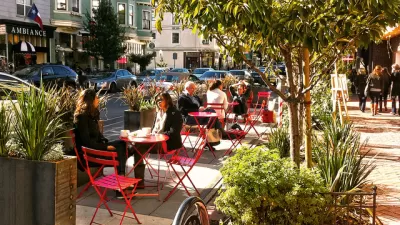An interview with REBAR design collective, creators of PARK(ing) Day, about using humor and absurdity to advance ideas for improving cities.
Johanna Hoffman talks with REBAR's Matthew Passmore:
JOHANNA: "Two themes that seem to run throughout REBAR's projects are the absurd and the generous. Events like PARK(ing) Day are these hilarious ways to re-appropriate public space, but they also provide random strangers with unexpected gifts like shade, food and drink, portable libraries, and more. Why these dual foci of absurdity and generosity?"
PASSMORE: "I think, on the side of absurdity, if you're trying to make an aesthetic or political statement or some kind of activist statement, humor and absurdity are very effective tools by which to make your message heard. For example, PARK(ing) Day is a critical look at how cities are used and broken up, who uses them, and for whom are they designed. In our opinion the city is designed around the automobile. So we could make signs and go to meetings and protest this imbalance that we see in terms of spatial use in our city, or we could take this matter into our own hands and make these things that are silly and open to the public and do so in a way that is generous. Having that sense of humor makes your critical statement more effective."
FULL STORY: Interview: REBAR makes simple yet powerful statements about the how and why of city design

Maui's Vacation Rental Debate Turns Ugly
Verbal attacks, misinformation campaigns and fistfights plague a high-stakes debate to convert thousands of vacation rentals into long-term housing.

Planetizen Federal Action Tracker
A weekly monitor of how Trump’s orders and actions are impacting planners and planning in America.

In Urban Planning, AI Prompting Could be the New Design Thinking
Creativity has long been key to great urban design. What if we see AI as our new creative partner?

Massachusetts Budget Helps Close MBTA Budget Gap
The budget signed by Gov. Maura Healey includes $470 million in MBTA funding for the next fiscal year.

Milwaukee Launches Vision Zero Plan
Seven years after the city signed its Complete Streets Policy, the city is doubling down on its efforts to eliminate traffic deaths.

Portland Raises Parking Fees to Pay for Street Maintenance
The city is struggling to bridge a massive budget gap at the Bureau of Transportation, which largely depleted its reserves during the Civd-19 pandemic.
Urban Design for Planners 1: Software Tools
This six-course series explores essential urban design concepts using open source software and equips planners with the tools they need to participate fully in the urban design process.
Planning for Universal Design
Learn the tools for implementing Universal Design in planning regulations.
Gallatin County Department of Planning & Community Development
Heyer Gruel & Associates PA
JM Goldson LLC
City of Camden Redevelopment Agency
City of Astoria
Transportation Research & Education Center (TREC) at Portland State University
Jefferson Parish Government
Camden Redevelopment Agency
City of Claremont



























